![]()
Alamolhoda’s costly remarks
After the release of video footage revealing the remarks made by Mashhad’s Friday prayer imam about Iran’s direct influence in Iraq and Lebanon, his words have been taken as direct evidence of Iran’s interference in these countries. The editorial of Iran daily focuses on the huge costs of the remarks made, in particular, by someone who is not in charge of Iran’s foreign policy.
When observers look at Iran’s political domain from outside, they are surprised that anyone can express his opinion concerning all issues – even on issues that are not within his powers. This point gains importance particularly in sensitive cases such as Iran’s foreign policy, where a misspoken word can create controversy and even end in a crisis with other countries.
We mustn’t forget that delivering speeches, without deliberation, about sensitive issues like foreign relations can be very costly. That is why officials from other countries generally deliver their speeches from written texts just to make sure they won’t make any mistake. Contrary to that, Iranian officials usually talk about all issues spontaneously – in most cases without preparation, prior thinking, and deliberation!
The situation gets worse when such speeches are delivered directly to the people in a live TV program, just as it is the case when we see that Friday prayer imams disregard all political rules and regulations and talk about all issues related to foreign policy.
In the domain of foreign policy, it must be made clear, apart from the supreme leader and the foreign minister, who else is allowed to comment regarding Iran’s foreign relations.
If the remarks of Alamolhoda regarding Iran’s influence in Iraq and Lebanon were repeated by other Friday prayer imams, then we could say that such remarks were coordinated and the imams were told to make them. But when we see that these remarks were only made by Alamolhoda, we have to conclude that these are his personal remarks.
Now the question is: who is to be held accountable for such costly remarks, particularly when Arab countries strongly reacted against them, calling them evidence of Iran’s interference in the region?
Iran
Zarif’s controversial remarks
Following Iran’s lawmakers questioning the Iranian Foreign Minister Mohammad Javad Zarf, the editorial of Arman Melli questions their motives in this regard.
During the past three months, Zarif has gone to the parliament eight times to answer questions. Posing questions to the executive branch is a lawmaker’s right and duty. Lawmakers can ask questions to members of the executive branch, as well as oversee their affairs and behavior. They can even go as far as impeaching officials, if necessary.
As for the particular case of Zarif, however, we must have two points in mind. First, determining the establishment’s strategic policies in foreign relations, according to the constitution of the Islamic Republic, is within the powers of the supreme leader. In this regard, the executive branch has no role but to execute Iran’s foreign policy.
As Zarif made it clear in the parliament, Iran’s foreign minister is just in charge of following up on the Islamic Republic’s foreign policies and implementing them.
For example, Zarif was criticized for Iran’s step-by-step reduction of its nuclear commitments. It must be noted that this issue was decided by the Supreme National Security Council and endorsed by the supreme leader. So it seems that by criticizing the foreign minister on this issue Iranian lawmakers want to play a similar role to lawmakers in developed, democratic countries by challenging the minister.
Second, as we get closer to the time of elections in Iran, some officials and lawmakers present themselves as critics of the executive branch to gain votes. Some of the questions raised by Iran’s lawmakers are in this vein: by raising such questions, they intend to look like critics of the status quo.
Keeping these two points in mind, we realize that the questioning of executive officials by lawmakers is not primarily motivated by them wanting to fulfill their responsibility. As a matter of fact, some lawmakers have hidden political motives to do so.
Arman Melli
Shanghai’s doors are closed to Iran
The editorial of Jahan Sanat deals with why it is important for Iran to become a full member of the Shanghai Cooperation Organization (SCO) so it can enjoy both the economic and security benefits of full membership.
Iranian officials cannot deny the fact that the SCO has closed its doors to Iran. On one hand, Iran urgently needs to cooperate with each and every member of the SCO. On the other hand, member countries of this organization have repeatedly rejected Tehran’s demands for changing its status from observer to a full member.
Perhaps, if it were not for this urgent need, Tehran could have a better – or even more drastic – reaction to this lack of cooperation by SCO’s member countries.
In their official position, Iranian authorities argue that they are interested in becoming a full member of the SCO, with an observer status being enough to meet Tehran’s requirements and demands. The claim, of course, might be true, as Iran has good economic relations with some of the SCO’s member countries.
It might seem that the status of being an observer is enough for Iran, and changing Iran’s status wouldn’t serve the country’s interests. Based on such an argument, Iranian officials have emphasized that there is no need to make a change in Iran’s status.
But the issue is somehow more complicated. SCO’s treaty has two remits: economy and security. So, even if there is full economic cooperation, it is fulfilling only one of this treaty’s remits. If so, Iran will not enjoy this treaty’s security and defense cooperation. More importantly, member countries are not willing to have full security relations with the Islamic Republic.
Iran doesn’t seem to be happy with the current situation. Tehran has always insisted on becoming a full member of the SCO, which shows the importance of changing the status of Iran’s membership in this organization from observer to full member.
Jahan Sanat
![]()
Iran takes further steps in breaching the JCPOA;
Macron calls it “deeply concerning”
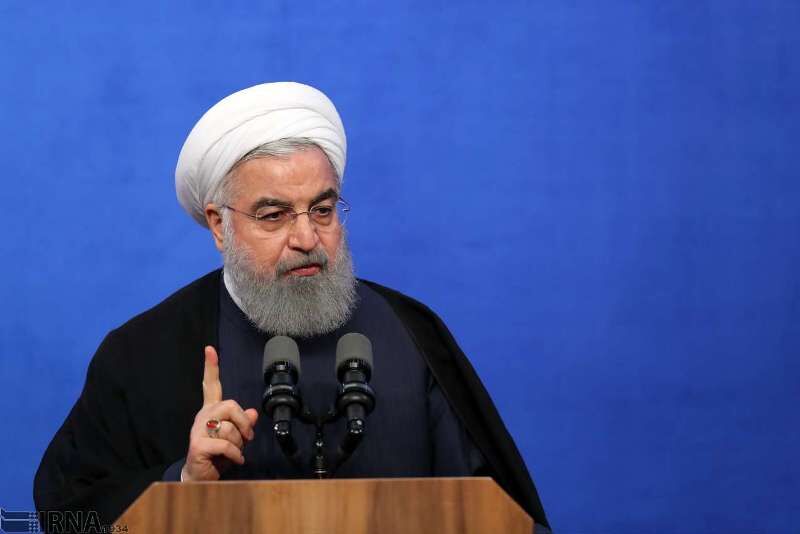
President Hassan Rouhani announced that Iran would start the fourth stage of reducing its commitments in the JCPOA on November 6. Rouhani said: “I will order the Atomic Energy Organization of Iran to start injecting gas [to centrifuges] at Fordow [nuclear facility].”
Rouhani also pointed out that Iran would continue “behind-the-scene” negotiations with other countries. He noted if the right solution is found out – that is, if the sanctions are lifted, and Iran can sell its oil easily and use its existing money in banks – then Iran will return to the previous conditions.
Iran’s president also said that the new activity would be monitored by the IAEA (International Atomic Energy Agency). “The fourth step is reversible like the other three,” asserted Rouhani, “If they return to their commitments, we’ll return to ours too.”
Iran has 1044 centrifuges at Fordow nuclear facility which were not supposed to be used for enriching uranium after the implementation of the JCPOA.
After Rouhani’s announcement, France, Britain, Russia, and the European Union expressed concerns regarding this decision.
French President Emmanuel Macron pointed out to Iran’s measure of injecting uranium gas at Fordow enrichment facilities, saying it is the first time Iran openly takes a step that shows its intention to pull out of the JCPOA. He said Iran’s fourth step in reducing commitments in the nuclear deal is ‘deeply concerning’, calling it a “deep change” in Iran’s position.
In the meantime, the Head of Atomic Energy Organization of Iran (AEOI) Ali Akbar Salehi announced that a chain of 30 IR6 centrifuges has been launched in Natanz nuclear facility.
Salehi added that the number of centrifuges Iran has installed during these two months is about 15 new generation centrifuges, calling it “a huge achievement.” He said currently Iran’s uranium enrichment capacity has reached 8,660 SWU.
IRNA
Young Journalists Club
The US puts imposed sanctions on 9 individuals close to Ali Khamenei including his son
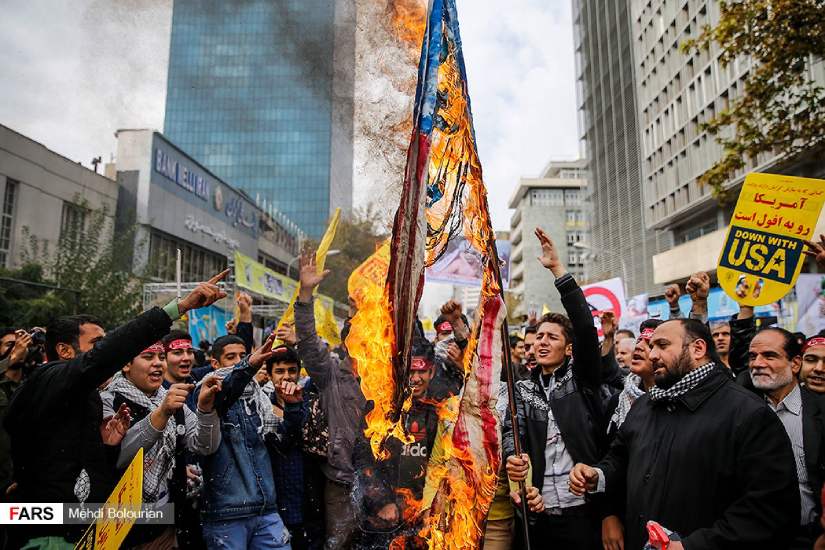
On November 4, the anniversary of the takeover of the US Embassy in Iran, the US Department of Treasury put sanctions on an entity and 9 individuals close to Iranian Supreme Leader Ali Khamenei. According to the Office of Foreign Assets Control (OFAC), Iran’s General Staff of Armed Forces and 9 individuals related to Khamenei who are in charge of advancing fundamental agendas of the Iranian regime have been sanctioned.
Mojtaba Khamenei (Ali Khamenei’s son), Ebrahim Raisi (Chief of the judiciary), Ali Akbar Velayati (Senior Advisor to Ali Khamenei in international affairs), Gholamali Rashid (Chief of Khatam al Anbiya Headquarters), Mohammad Bagheri (Chief of General Staff of the Armed Forces), Hossein Dehghan (former Defense Minister), Mohammad Golpayegani (Head of Khamenei’s office), Gholamali Hadad Adel (Mojtaba Khamenei’s father-in-law), Vahid Haghaniyan (Executive Deputy of Khamenei’s office) are included in the list of US sanctions.
In the statement of the US Department of the Treasury, it mentioned that these sanctions coincide with the 40th anniversary of the takeover of the US Embassy by the Islamic Republic, in which 50 Americans were taken as hostages for 444 days.
According to Steven Mnuchin, US Secretary of the Treasury, his department has targeted a number of officials appointed by the Islamic Republic’s leader who have had a role in Khamenei’s destabilizing policies and the Iranian regime’s destructive policies including the bombing of the US Navy’s headquarters in 1983 and a Jewish center in Argentina.
Iranian Foreign Ministry Spokesman Abbas Mousavi reacted to the new US sanctions, condemning such measures and calling them signs of America’s inability in engaging in logical diplomatic solutions.
Kayhan London
Euronews
Zarif admits to laundering thousands of billions of tomans in Iran
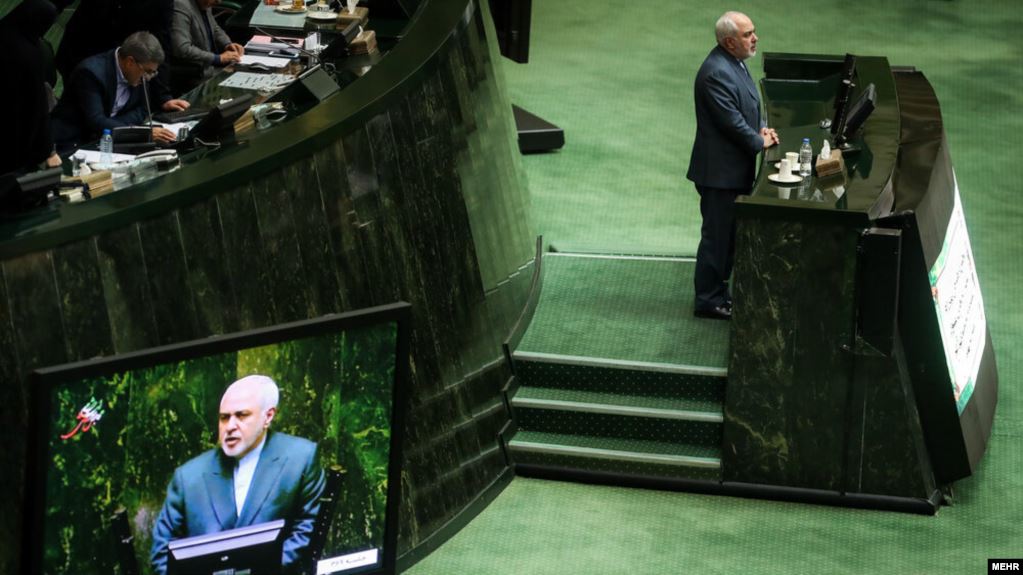
Iranian Foreign Minister Mohammad Javad Zarif says that the Islamic Republic is not involved in money laundering, yet he announced that thousands of billions of tomans are laundered in Iran.
He also mentioned that the so-called pressure groups in Iran that have interests in this regard don’t want Iran to join the international convention for countering terrorism and money laundering. He added that thousands of billions of tomans are laundered by gangs involved in Forex and gold coin smuggling.
Two bills for Iran joining the CFT, as well Iran joining the Convention against Transnational Organized Crime (Palermo Convention), haven’t been yet ratified by Iran’s Expediency Council, despite requests by the Iranian government.
Meanwhile, Gholamreza Ansari, the Deputy to Iran’s foreign minister said in an interview that if Iran doesn’t ratify FATF’s bills before the set deadline, it will be “like a death blow” to Iran’s banking system, which has already been severely damaged because of the US sanctions.
According to Ansari, FATF is “like having a passport”, meaning that if Iran’s banking system is bent on having any kind of relationship with the world’s banking system, it is only possible through FATF. Ansari added that countries that are even close to Iran have said they will not be able to have any banking transactions with Iran after FATF’s deadline.
FATF is an entity overseeing the transference of money, aiming to stop global financial crimes and financing terrorism. It has also asked its member countries to carefully scrutinize financial transactions with Iran and the investment of companies that are active in Iran.
Radio Farda
BBC Persian
Iran’s dual policy against demonstrations in Arab countries
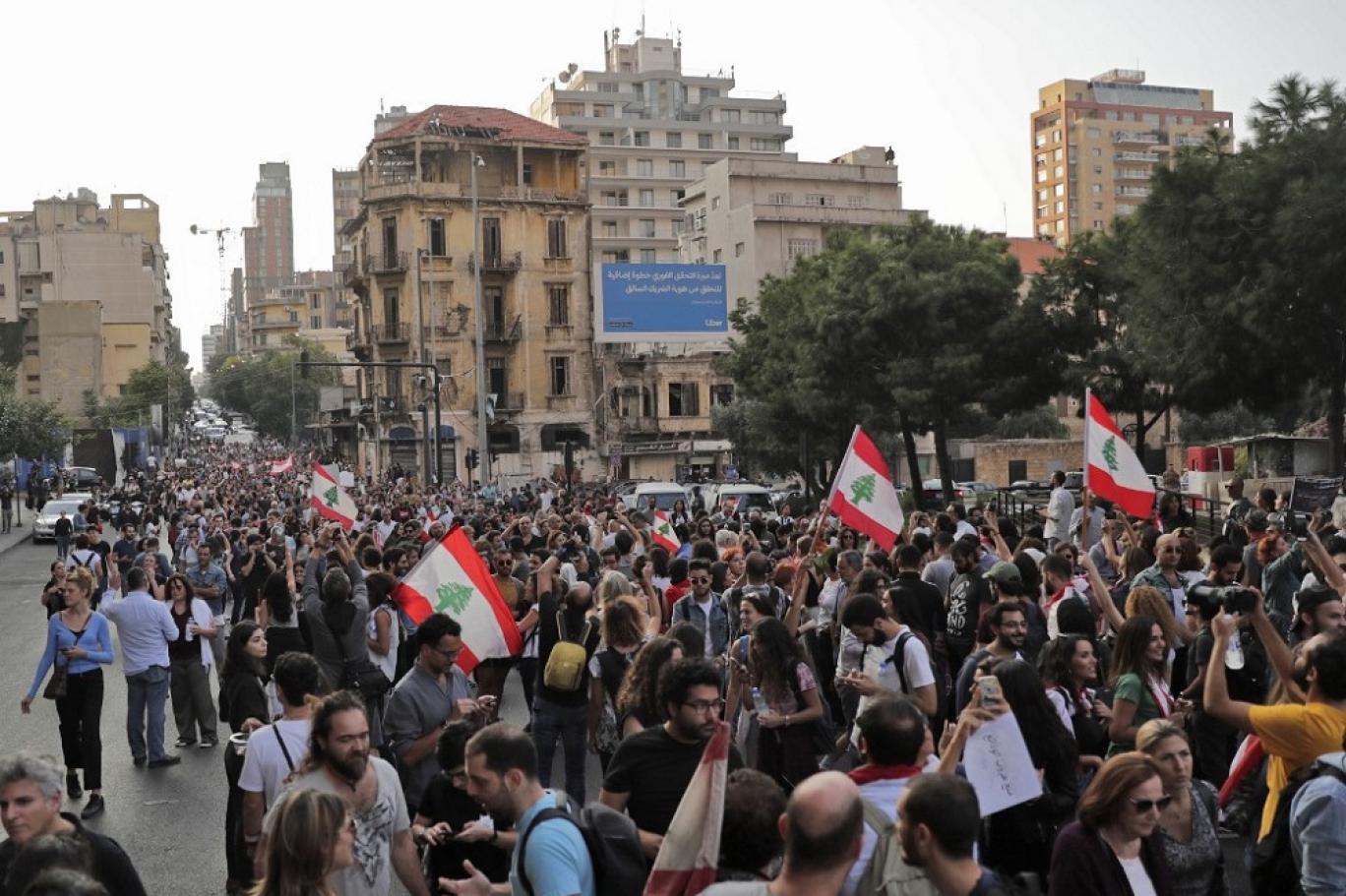
Iran has had a hypocritical policy in the context of the demonstrations that have taken place in the Arab world since 2011. For example, Iran welcomed the demonstrations that took place in Egypt and Bahrain; whereas it has criticized the demonstrations that are ongoing in Lebanon and Iraq; as well as militarily intervening to neutralize protests in Syria.
When the demonstrations started in Egypt, Iranian Supreme Leader Ali Khamenei welcomed them by saying: “Demonstrations in Egypt are a kind of Islamic awakening, influenced and inspired by the Islamic Revolution in Iran”.
Also, when the demonstrations broke out in Bahrain, Iran openly meddled by backing the demonstrators, so much so that the Gulf countries accused Iran of backing Shiite groups in order to create insecurity and instability in these countries.
When demonstrations started in Syria, Iran called them a conspiracy by the western countries to overthrow Assad’s regime. But that was not all. Iran interfered in Syria with all possible political and military means and participated in killing Syrians along with Assad’s Baathist regime. Even some IRGC Quds officials were killed in this war against the Syrian people.
Likewise, after demonstrations and protests broke out this year in Lebanon and Iraq, the Islamic Republic’s supreme leader used the same language as in the case of Syria. He said that “the enemies are planning to create chaos and insecurity in some regional countries. America and western countries’ intelligence services are behind these issues.”
This is how Khamenei seeks to justify Iran’s intervention in these countries. Of course, Iran’s slogans in defense of the poor and resistance have become threadbare and will not deceive anyone.
Demonstrations in Arab countries since 2011 created a chance for Iran to interfere in the affairs of its allied countries. Yet at the same time, they exposed the Islamic Republic’s double standard policy.
Independent Persian
Iran’s Intelligence Ministry bans cooperation with the British Council
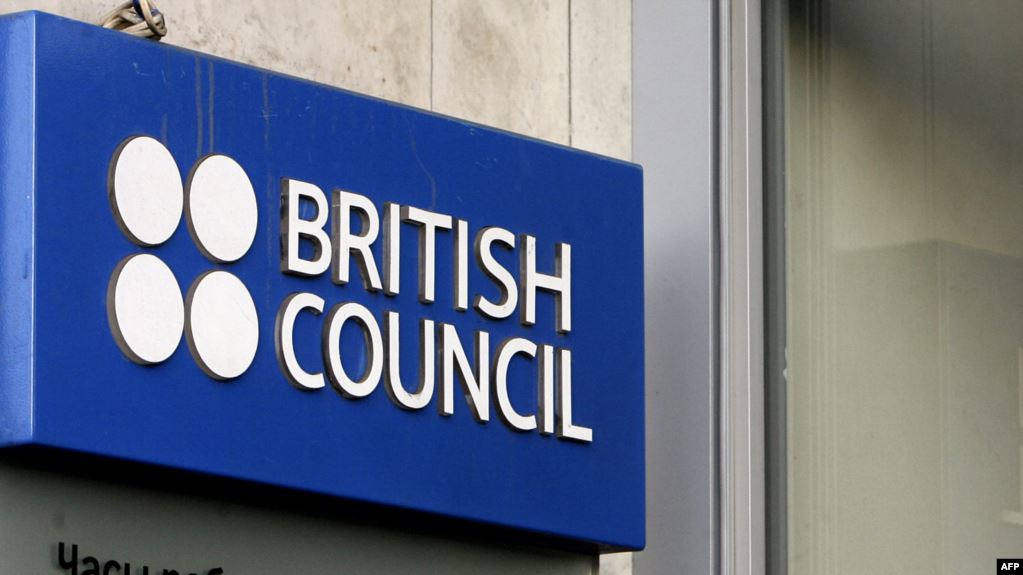
Iran’s Intelligence Ministry has banned any cooperation with the British Council, warning to prosecute all the “offenders” in this regard. In a statement, Iran’s Intelligence Ministry said the United Kingdom has “a long record in infiltration, networking, and trend-making in different countries”, claiming that the British Council planned to “run a project aiming at cultural networking” in Iran.
The statement also said the “project” of cultural networking in Iran was in process and included a number of those belonging to the elite as well as those active in educational and cultural fields. According to the statement, however, the intelligence ministry’s agents prevented the implementation of this project.
Iran’s Judiciary previously accused Aras Amiri, a former British Council employee, of “infiltration into society through arts and subversive measures”, sentencing her to 10 years of imprisonment in September. Meanwhile, Amiri wrote a letter to the Judiciary Chief Ebrahim Raisi, saying Iran’s security institutions had asked her to cooperate with them but she refused to do so.
Aras Amiri was an M.A. student at arts philosophy before traveling to Iran. She was also an employee of the British Council, helping with holding cultural events, including art exhibitions and film festivals, between Iran and the U.K.
Radio Farda
7 football fans arrested after chanting slogans in support of Turkey at a stadium
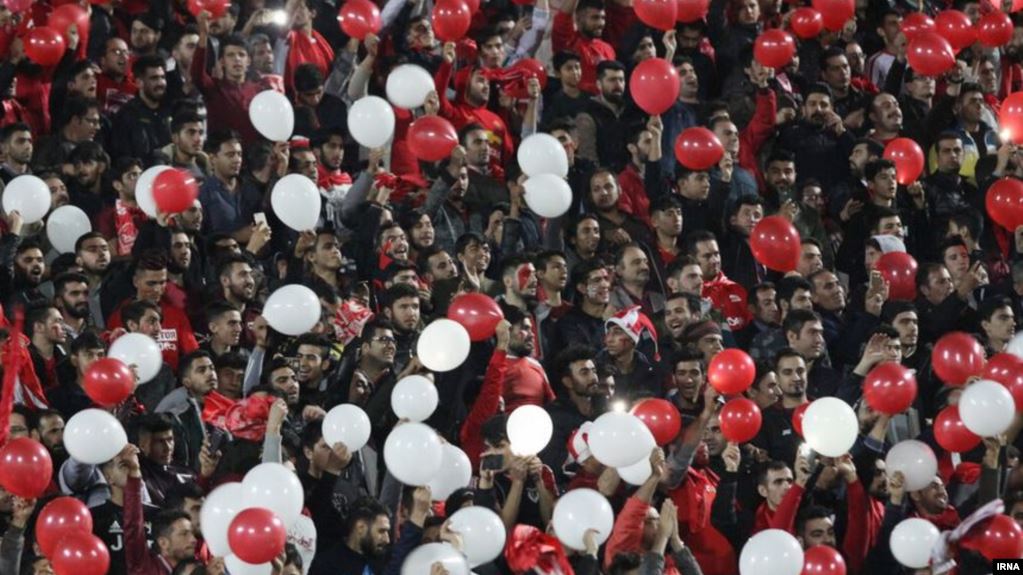 Seven football fans who had attended a game between two football teams in the city of Tabriz – located in East Azerbaijan province – were arrested after they chanted slogans in support of Turkey. During the game between Tractor Sazi F.C. and Esteghlal F.C., a number of spectators also shouted “death to Kurds” to show their support for Turkey.
Seven football fans who had attended a game between two football teams in the city of Tabriz – located in East Azerbaijan province – were arrested after they chanted slogans in support of Turkey. During the game between Tractor Sazi F.C. and Esteghlal F.C., a number of spectators also shouted “death to Kurds” to show their support for Turkey.
Some other spectators also carried placards which said, “either Czechoslovakia or Yugoslavia”, referring to the peaceful dissolution of Czechoslovakia into the Czech Republic and Slovakia in January 1993, as well as the breakup of Yugoslavia as a result of bloody domestic wars in the 1990s.
Following these arrests at the stadium, Iran’s minister of sports and youth announced that a workshop for protecting moral and cultural values will be established. The workshop will consist of representatives from Iran’s Intelligence Ministry, Ministry of Culture and Islamic Guidance, IRIB, Football Federation, Parliament’s Cultural Committee, police, IRGC, and some sports clubs.
Radio Farda
